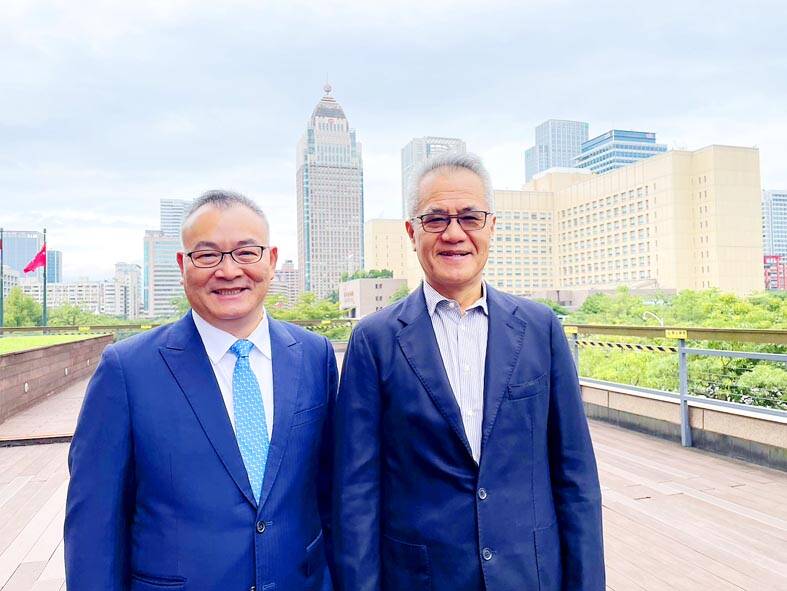Chip testing interface supplier WinWay Technology Co (穎崴) yesterday said it would double its probe capacity next year to meet strong chip testing demand for artificial intelligence (AI) applications and servers.
The company also downplayed concerns over a potential AI bubble, saying demand for WinWay’s testing services and products has been strong since last year, and that it has not seen signs of weakness.
“Strong customer demand is pushing up factory utilization to a nervous level in the fourth quarter,” WinWay chairman Mark Wang (王嘉煌) said. “We are pretty optimistic about market demand and expect our revenue to grow next year.”

Photo: CNA
WinWay expects double-digit percentage growth in revenue next year, Wang said.
Revenue for the first three quarters of this year surged 32 percent year-on-year to NT$5.62 billion (US$179.6 million), with AI and high-performing computing applications accounting for 44 percent.
Coaxial sockets made up 41 percent, followed by vertical probe cards at 32 percent, company data showed.
A probe card is an interface tool used in semiconductor manufacturing that creates an electrical connection between an IC on a silicon wafer and automated test equipment to identify defective chips. Probes are the microscopic needles on the card that make direct contact with the wafer's test pads.
With strong market demand, WinWay plans to expand its probe capacity to about 6 million to 7 million units per month at its Kaohsiung plant, compared with 3.5 million units now, Wang said.
The strong momentum is not limited to AI and advanced chips, but also extends to less advanced chips, he added.
A growing number of large companies, including cloud service providers, are also seeking to develop their own AI chips, which would underpin the market’s further growth, Wang said.
WinWay is next year planning to build its first manufacturing plant in Arizona, in response to US customers’ demand for local capacity amid geopolitical risks, he said, adding that some customers are requesting a third manufacturing site based on their “no China, no Taiwan” policy.
The US factory is expected to start operations in the second half of next year, focused on coaxial sockets and probe cards used in advanced packaging technology, Wang said.
The company plans to invest between NT$500 million and NT$1 billion in the US plant, he added.
WinWay’s new micro electro mechanical systems (MEMS) probe card is making progress, as a major project is entering the second phase of a partnership with a customer, Wang said, adding that it had a larger scale and longer supply agreement of at least five years.
A MEMS probe card is an advanced tool used for electrically testing semiconductor wafers.
The company said its net profit for the first three quarters soared by 43.72 percent annually to NT$1.19 billion from NT$828 million. Earnings per share leapt to NT$33.4 from NT$24.08, and gross margin rose to 46.62 percent from NT$42.25 over the period.

JITTERS: Nexperia has a 20 percent market share for chips powering simpler features such as window controls, and changing supply chains could take years European carmakers are looking into ways to scratch components made with parts from China, spooked by deepening geopolitical spats playing out through chipmaker Nexperia BV and Beijing’s export controls on rare earths. To protect operations from trade ructions, several automakers are pushing major suppliers to find permanent alternatives to Chinese semiconductors, people familiar with the matter said. The industry is considering broader changes to its supply chain to adapt to shifting geopolitics, Europe’s main suppliers lobby CLEPA head Matthias Zink said. “We had some indications already — questions like: ‘How can you supply me without this dependency on China?’” Zink, who also

Taiwan Semiconductor Manufacturing Co (TSMC, 台積電) received about NT$147 billion (US$4.71 billion) in subsidies from the US, Japanese, German and Chinese governments over the past two years for its global expansion. Financial data compiled by the world’s largest contract chipmaker showed the company secured NT$4.77 billion in subsidies from the governments in the third quarter, bringing the total for the first three quarters of the year to about NT$71.9 billion. Along with the NT$75.16 billion in financial aid TSMC received last year, the chipmaker obtained NT$147 billion in subsidies in almost two years, the data showed. The subsidies received by its subsidiaries —

At least US$50 million for the freedom of an Emirati sheikh: That is the king’s ransom paid two weeks ago to militants linked to al-Qaeda who are pushing to topple the Malian government and impose Islamic law. Alongside a crippling fuel blockade, the Group for the Support of Islam and Muslims (JNIM) has made kidnapping wealthy foreigners for a ransom a pillar of its strategy of “economic jihad.” Its goal: Oust the junta, which has struggled to contain Mali’s decade-long insurgency since taking power following back-to-back coups in 2020 and 2021, by scaring away investors and paralyzing the west African country’s economy.

RE100 INITIATIVE: Exporters need sufficient supplies of renewable energy to meet their global commitments and remain competitive, the economics ministry said Local export-oriented manufacturers, including Taiwan Semiconductor Manufacturing Co (台積電), require sufficient supplies of green energy to maintain their competitiveness and regulations already ensure that renewable energy development adheres to environmental protection principles, the Ministry of Economic Affairs said yesterday, as the legislature imposed further restrictions on solar panel installations. The opposition-led Legislative Yuan yesterday passed third readings to proposed amendments to three acts — the Environmental Impact Assessment Act (環境影響評估法), the Act for the Development of Tourism (發展觀光條例) and the Geology Act (地質法) — which would largely prohibit the construction of solar panels in some areas. The amendments stipulate that ground-mounted solar